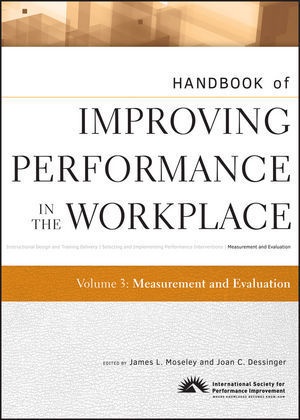Read more
Informationen zum Autor THE EDITORS James L. Moseley is an associate professor of Instructional Technology at Wayne State University, College of Education. He teaches program evaluation and human performance technology and directs doctoral dissertations. He is co-author of five books, three of which have won ISPI Awards for Excellence in Instructional Communication. He is a frequent contributor to Pfeiffer/Wiley publications including the Pfeiffer Annuals . He has won numerous awards for teaching and mentoring and frequently consults with business, industry, and health care on program evaluation and human performance. His new area of interest focuses on older worker and older learner issues. Joan Conway Dessinger is a consultant, writer, editor, and an adjunct faculty member in the Wayne State University Instructional Technology program. She founded The Lake Group, a performance improvement consulting firm. She is the co-author of five books, three of which have won ISPI Awards for Excellence in Instructional Communication. She is a contributor to Distance Training and Sustaining Distance Training , both (Jossey-Bass), the Handbook of Human Performance Technology ; and the 2007 Pfeiffer Annual (Pfeiffer). Klappentext Volume Three of the Handbook of Improving Performance in the Workplace focuses on Measurement and Evaluation and represents an invaluable addition to the literature that supports the field and practice of Instructional Systems Design.With contributions from leading national scholars and practitioners, this volume is filled with information on time-tested theories, leading-edge research, developments, and applications and provides a comprehensive review of the most pertinent information available on critical topics, including: Measuring and Evaluating Learning and Performance, Designing Evaluation, Qualitative and Quantitative Performance Measurements, Evidence-based Performance Measurements, Analyzing Data, Planning Performance Measurement and Evaluation, Strategies for Implementation, Business Evaluation Strategy, Measurement and Evaluation in Non-Profit Sectors, among many others. It also contains illustrative case studies and performance support tools.Sponsored by International Society for Performance Improvement (ISPI), the Handbook of Improving Performance in the Workplace, three-volume reference, covers three core areas of interest including Instructional Design and Training Delivery, Selecting and Implementing Performance Interventions, and Measurement and Evaluation. Zusammenfassung This cross-disciplinary, international Handbook brings together best-in-field research and practice to provide an up-to-date summary of the leading ideas in performance measurement, theory, and practice. Inhaltsverzeichnis List of Case Studies, Exhibits, Figures, Performance Support Tools, and Tables xiii Introduction to Volume Three xvii Acknowledgements xxv PART ONE: PERSPECTIVES IN MEASUREMENT AND EVALUATION 1 1 Measurement, Evaluation, and Research: Feedback for Decision Making 3 Carl Binder 2 Measurement and Evaluation in the Workplace 25 Lori G. Bosteder, Darlene Russ-Eft 3 Unleashing the Positive Power of Measurement in the Workplace 43 Dean R. Spitzer 4 Relating Training to Business Performance: The Case for a Business Evaluation Strategy 59 William J Tarnacki II, Eileen R. Banchoff 5 Success Case Methodology in Measurement and Evaluation 76 Anne M. Apking, Tim Mooney PART TWO: PILLARS IN MEASUREMENT AND EVALUATION 95 6 Needs Assessment: A Lighthouse Beacon 97 Catherine M. Sleezer, Darlene Russ-Eft 7 The Impact Evaluation Process 113 Ingrid J. Guerra-López 8 Full-Scope Evaluation: Do You "Re...

